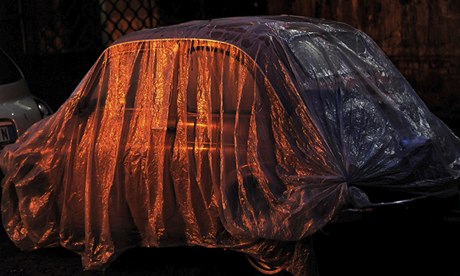
Plastic sheeting protects a Fiat from starling droppings while parked near the Tiber river in Rome. Photograph: Filippo Monteforte/AFP/Getty Images
Romans are staying at home or shielding themselves with umbrellas before venturing out this autumn as the city is bombarded with tonnes of slippery and foul-smelling excrement by millions of migrating starlings.
The problem is annual, but this year the cash-struck city has failed to muster the 40,000 euros it usually spends on hiring 20 people to walk under plane trees lining the Tiber – where the birds roost en route to Africa – with loudspeakers in order to scare them off with recordings of the screeching noise starlings make when predatory falcons approach.
Without this critical deterrent, the usually manageable problem has become a plague this year, with pavements, benches and monuments unrecognisable under a crust of guano. Roads have become a slick of waste, sending scooter riders skidding.
“During their stay in Rome, the birds fly out in the countryside and eat olives off the trees, so their mess becomes oily and more dangerous for mopeds, which have been involved in accidents,” said council spokeswoman Raffaella Mercolella.
The loudspeaker-wielding council workers usually head out at dusk, when the birds return from foraging.
“The recordings are efficient, but they usually start in October,” said Mercolella, adding that this year, the city’s budget was being approved with a “huge delay” due to council elections earlier this year. The 40,000 euros had now been found, however, and the city will soon be full of the familiar, recorded screeching sound of starlings, to Rome’s huge relief.